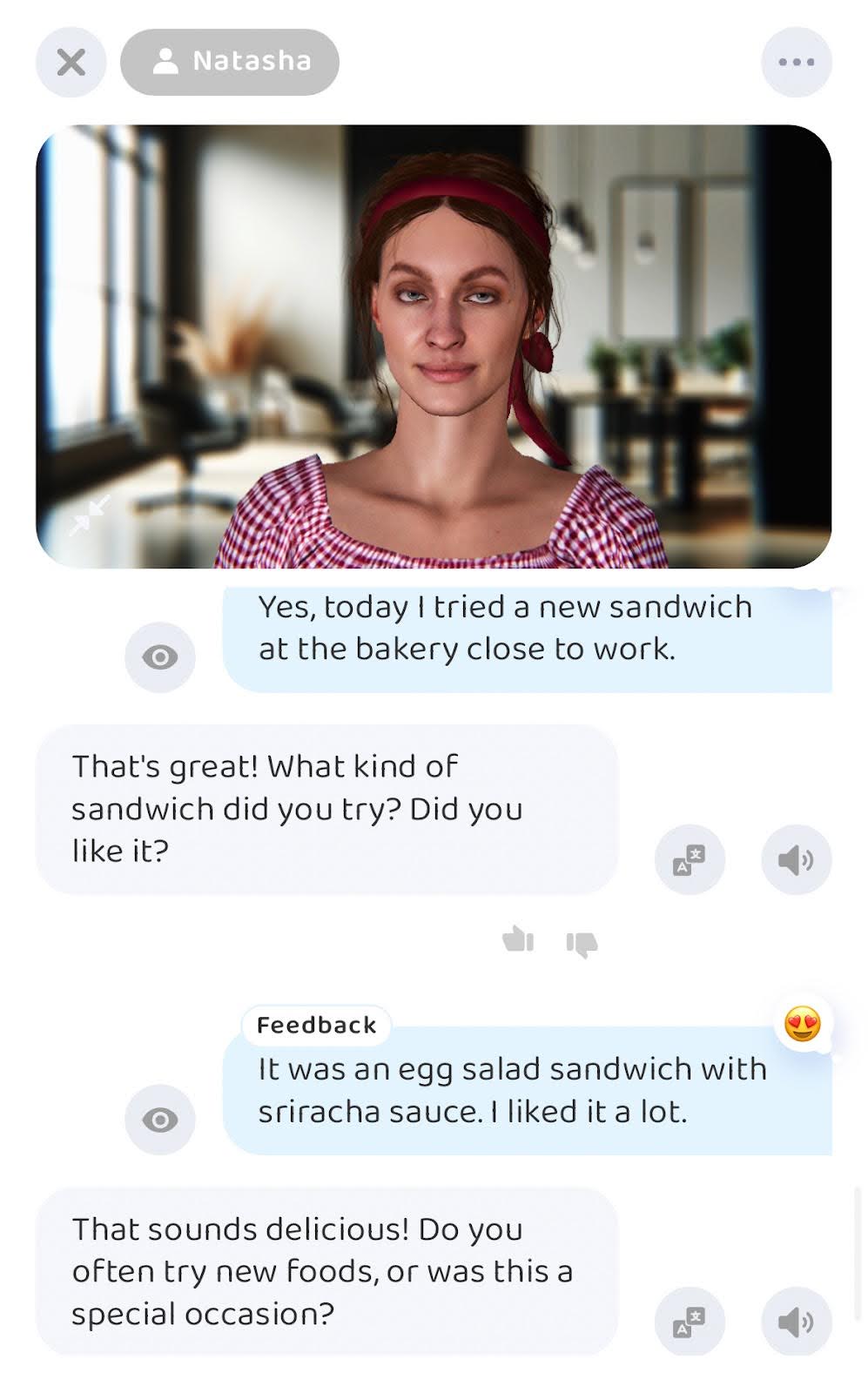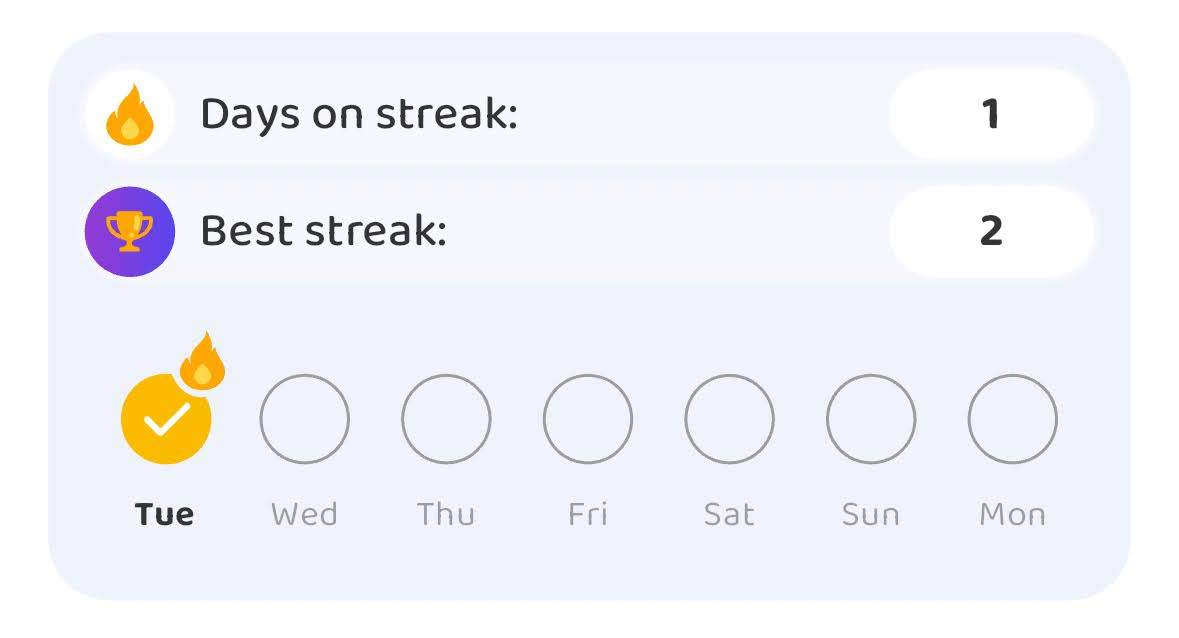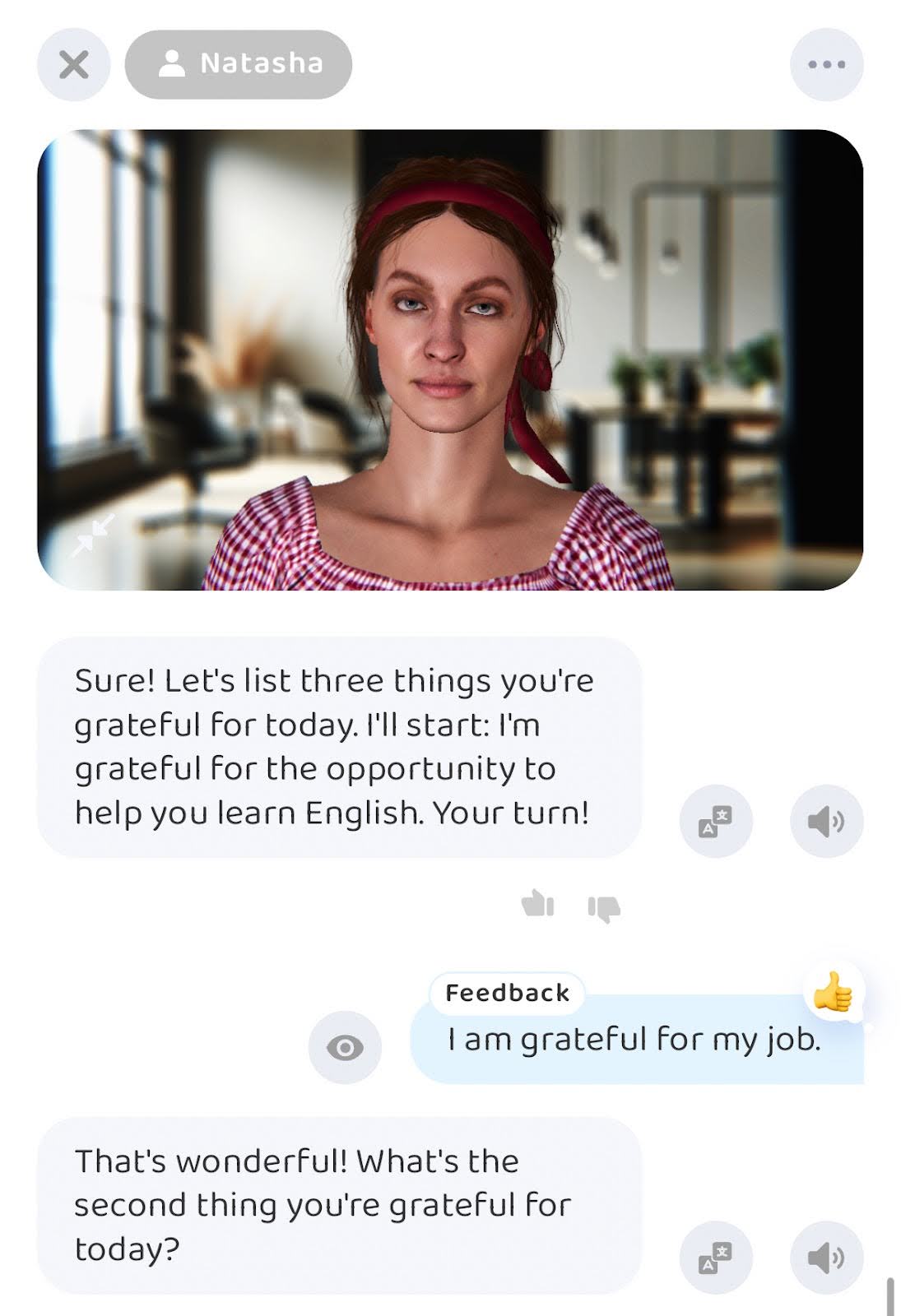Hi friend! Natasha here—your go-to Praktika tutor and robotics geek. Today, we’re diving into one of the big milestones in language learning: thinking in English. Spoiler alert: it’s not as intimidating as it sounds! I’ll share some practical tips to get you started, each paired with a fun GIF and a little help from Praktika’s unique features. Let’s get those gears turning in English!
Start Simple—Think About Everyday Items
💡Try using Praktika to reinforce new words during a short daily lesson. The more you repeat them with guidance, the easier it becomes to remember them without translating. This is especially good for beginners because the vocab is very simple and straightforward!
1. Name Everything Around You
- Look around your home—everything you see has a name in English. When you spot a lamp, think “lamp.” When you pick up your toothbrush, think “toothbrush.” No need for translation, just link the object directly to the English word.
2. In the Kitchen
- Picture yourself in the kitchen: you’re grabbing a spoon for your cereal, then opening the refrigerator. Instead of thinking of these items in your native language, say them in English:
- Spoon
- Cereal
- Refrigerator
- It’s all about creating a habit where English words come first. Over time, these items will naturally be associated with their English names.
3. Describe Your Walk
- Imagine you’re heading out for a walk. Mentally label things you see:
- Tree
- Car
- Cloud
- Try adding simple adjectives to make it more engaging:
- Tall tree
- Red car
- Fluffy cloud
- It’s like playing a mental game, and the more you do it, the quicker these words will come to you without hesitation.
4. Fit It Into Your Routine
- Don’t worry if you’re busy—this can fit easily into your daily life. Just ten minutes (or maybe even just 5!) of labeling items while you go about your day makes a difference.
- Think of it as creating a mental vocabulary list while doing things you’re already doing. This simple practice, paired with short and flexible lessons, helps make English part of your day in a manageable way.
Praktika helps you take learning a step further by helping you create a rich language environment with contextual learning. Whether you’re practicing through role-play scenarios or short, flexible lessons, you’ll seamlessly integrate English into your routine while reinforcing words and phrases in real-life situations.
Talk to Yourself—In Your Head or Out Loud
💡Practice real-life situations with AI avatars like me that simulate everyday conversations. It makes talking to yourself feel a little less odd and a lot more productive!

1. Narrate Your Actions
- Whether you’re brushing your teeth, cooking breakfast, or driving to work, start narrating what you’re doing in English. It might feel silly at first, but it’s an effective way to get comfortable thinking in English.
- For example, say out loud, “I’m pouring milk into my coffee,” or “I’m putting on my shoes.” It helps reinforce vocabulary and makes English a natural part of your daily routine.
2. Use Mirrors to Practice Conversations
- Find a mirror and pretend you’re talking to someone—whether it’s introducing yourself, making small talk, or explaining your plans for the day. Looking at yourself while speaking can help boost confidence and make the exercise feel more like a real conversation.
- For instance, try practicing a short introduction: “Hi, I’m Natasha. I’m learning English because I want to travel more.”
3. Make It Fun with Questions
- Ask yourself questions in English and then answer them. This helps keep your mind actively engaged. Simple questions like “What should I have for lunch?” or “What do I need to do today?” are perfect to start with.
- The goal is to make English your go-to language for thinking, even for mundane tasks.
Dive Into English Media—Movies, Music, and More
💡 With Praktika’s interactive lessons, you can discuss the movies or songs you’ve listened to, practicing vocabulary and improving comprehension in a fun, relaxed way!
1. Watch Your Favorite Movies in English
- Watching movies in English is one of the best ways to immerse yourself in the language. Choose a movie you already know and love, so you don’t have to worry about following the plot—just focus on the dialogue.
- Start by watching with subtitles in English, then try watching without them once you’re more comfortable.
- Pick up on common phrases, slang, and natural intonation that actors use. This will make your own English sound more authentic.
2. Listen to English Music and Sing Along
- Music is an excellent tool for learning pronunciation and rhythm in English. Choose your favorite songs, look up the lyrics, and sing along. Listen to our Spotify playlist for a tailored list of songs!
- For example, find a catchy song, listen to it a few times, and then sing along. This will help you learn new words and get comfortable with their pronunciation.
3. Explore English Podcasts
- Podcasts are perfect for practicing listening skills. Pick topics you find interesting—whether it’s comedy, history, or interviews—and listen during your daily routine.
- Challenge yourself to summarize what you heard afterward. This will help reinforce the vocabulary and phrases you learned.
4. Keep your daily streak at Praktika
- Track and celebrate your progress!

Think in English Before Sleeping
💡Even if you only have a few minutes, Praktika’s flexible lessons can help you practice reflecting on your day. This consistent bedtime habit makes thinking in English a natural part of your routine!
1. Reflect on Your Day in English
- Spend a few minutes before falling asleep thinking about your day—in English! It doesn’t have to be complicated. Just go over simple details like what you did, what you ate, or something that made you happy.
- For example, “Today, I went to the store, bought some apples, and watched a movie.” It’s all about building the habit of thinking in English consistently.
2. Plan Tomorrow in English
- Take a moment to plan what you need to do the next day. This not only helps you practice thinking in English but also sets a positive intention for tomorrow. You can discuss it with your avatar because we’re not just your tutors but your friends!
- For instance, think, “Tomorrow, I will go to the gym, finish my project, and call my friend.” This helps you rehearse useful phrases and gives you confidence for real-life use.
3. Practice Gratitude
- Reflecting on things you’re grateful for in English is a great way to reinforce positive thoughts while also practicing the language. You can practice this with me, too!
- For example, “I’m thankful for the delicious dinner I had” or “I’m grateful for the time I spent with my family today.”

Thinking in English is all about forming small, manageable habits. With Praktika’s engaging tools, you can seamlessly integrate English into your thoughts and routines. Remember, consistency is key—every small effort you make will bring you closer to fluency. Ready to take the leap and start thinking in English? Let’s do it together!

From Natasha
Natasha holds a PhD in Mechanical Engineering from MIT and is a lead robotics engineer. With experience in both startups and major tech companies, she understands the challenges of technical English for non-native speakers. In her free time, she enjoys tech projects, cycling, and her Marvel comics collection.
